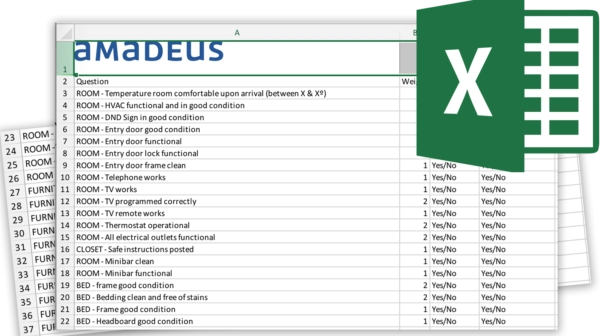
Best practices for a data-driven strategy now and in the future
Depending on where in the world your hotel is located, you are dealing with a different stage of the COVID-19 outbreak. The unprecedented impact of this crisis has hit the hotel and larger hospitality industry particularly hard. Amid all this uncertainty, it is critical for hoteliers to identify best practices to safeguard their business now and in the future as the travel industry begins to rebound.
Where to Start? Protecting Your Hotel During a Crisis
Data is the single most important element to prepare and protect your hotel in these trying times. Instead of reflexively reducing room rates, you’ll want to analyze current and historical data to determine what your go-forward revenue strategy should be. Get started with these simple steps:
Revenue Management
1. Assess the competition regularly – How is your local market reacting? Are they changing their prices?
2. Review historical data – What cost-cutting or alternative measures have you applied during previous slow seasons or economic downturns? Have they been effective? Have customers and groups stayed with you?
3. Introduce a more flexible cancellation policy – Apply this to all travel segments, whether your focus is transient, groups, or business. Encourage customers to rebook to future dates now, instead of losing their business entirely to cancellations.
4. Maximize direct bookings – Prioritize the channels that continue to drive revenue while maintaining rate parity. Entice potential shoppers, not by dropping ADR, but by waiving fees, matching special offers from other OTAs or distributors, or offering private promotions through your direct booking channel to collect the most revenue.
Service and Cleaning
For hoteliers, the safety and wellbeing of both staff and guests are critical. To win business in this climate, you’ll need to make sure you are doing everything possible to minimize health risks and maximize how you communicate that beyond your front doors. Here’s how:
1. Determine a plan of action and create a checklist for deep-cleaning hotel rooms, meeting spaces, restaurants, as well as the fitness center, pool, and other public areas.
2. Get the Front Desk, Housekeeping, and Engineering teams aligned to avoid significant disruption to operations and room readiness.
3. Make sure all team members are empowered to flag areas of concern and have the tools they need or a common space to log the information, so nothing gets left behind.
4. Consider pausing cleaning opt-out programs to reduce the potential spread of germs and viruses. Sustainability is important, but during a crisis situation, it’s more important your hotel remains visible in its commitment to cleanliness.
5. Clearly communicate your service and cleaning protocols with your guests in pre-stay, on-property, and post-stay communications.
Ultimately, your goal is to ease the worry of guests arriving at your property. A confident response from the front of the house about your property’s steps to mitigate the risks of COVID-19 can reassure any weary traveler in their decision to stay with you.
Guest Communication and Brand Reputation
Maintaining valuable guest relationships and your brand promise is more important than ever during a crisis. Be proactive in your communication and marketing initiatives so customers know they can count on you during difficult times. Our recommended strategies include:
1. Leverage your public-facing channels – Use email, your website, and social media to communicate to guests what they should expect on site and any up-to-the-minute changes in policies. Highlight your increased cleaning and safety protocols to provide reassurance. Be transparent about conditions in your area to avoid additional stress and questions from visitors.
2. Reach out to your most valuable customers – This includes event planners, those in your loyalty programs, and group or volume contract customers. Show your concern for their health and wellbeing by offering to turn any canceled reservations into credit for a later stay.
3. Communicate to your own people – Make sure everyone on your staff is on the same page with cleaning protocols and policy changes. Address their concerns regarding the crisis to maintain employee morale.
Prepare for the future
As you track data both in your area and globally, pay close attention to signs the market is recovering. You’ll want to have a strong marketing plan in place to win bookings the moment consumer confidence returns.
1. Identify travelers who are still booking with you and stay connected with top accounts. Create buyer profiles with data from your CRS or CRM and target similar audiences so you can stay top of mind once bookings pick up.
2. Think seasonal staycations – It’s likely many people will ease back into travel with shorter trips in their immediate area or domestically. Depending on whether this period is during your high or low season, think of ways to incentivize bookings. Is there a cultural event, conference, or festival happening that you can create a package around? Is your property known for its full-service spa or culinary program? Get creative with your offerings!
3. Contact your group and loyalty customers – reassure them you’re open and ready for business. Offering them exclusive pricing or a promotion is also a great way to get their attention to rebook.
4. Secure ad space before the competition – with hotels rushing to regain bookings, you need to stand out from the crowd. It’s important to restart and maintain your spend on branded terms in advance of competitors or OTAs picking those up, and focus metasearch or GDS ads to your target markets and customers. Don’t wait too long!
Even in a crisis, you can operate your hotel with confidence through data-driven decisions. By continuously shifting your plan to meet changing market conditions, you’ll be able to offer competitive rates, ensure timely and effective customer communications, and establish rigorous cleaning protocols, all while planning for an even stronger recovery.
Amadeus is here to help. We’ve created a portal of dedicated resources, tips, and checklists to help you manage your hotel during a crisis. If you have additional questions on how technology can support your needs, don’t hesitate to contact us.





